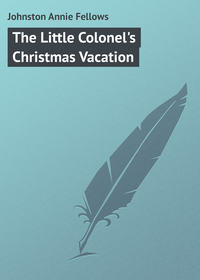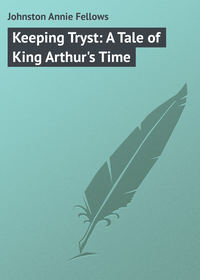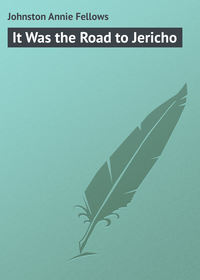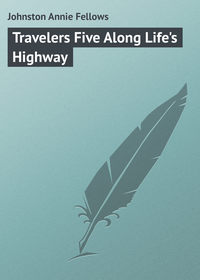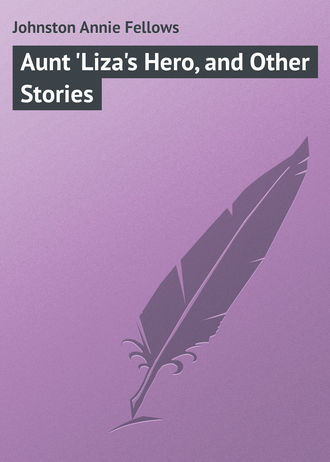
Aunt 'Liza's Hero, and Other Stories
"And be about as likely to get soap and knitting-needles as anything else!" replied her mother, with a frown. "It's a pity a boy as old as Abe is can't be trusted to remember anything!"
"Let Jimmy go," suggested Maria. "It's only three miles, and he can easily get back by dinner-time."
"Yes," said Mrs. Perkins, "I don't know of any reason why he shouldn't be trusted with the horse, and he can be depended on to do the errand a sight better than Abe."
Jimmy's freckled face beamed with delight. He had expected to spend the morning hoeing in the garden. He had been waiting the last half-hour for his father to call him and set him at work; but it was not the prospect of escaping a disagreeable task or of cantering along the road on the old blaze-faced horse that pleased him most. It was the fact that his mother and Maria regarded him as more trustworthy than Abe, and Abe was nearly grown.
He had never before so completely appreciated his true worth nor felt such a sense of his own importance as when his mother entrusted him with the errand, and gave him a message for the doctor's wife. Maria's words of praise were still in his ears when he ran down the path, hitching up a broken suspender as he went.
"What are you up to now?" inquired Abe, as Jimmy walked into the barn in a lordly way and took down the saddle.
"Up to takin' a ride," answered Jimmy, in a way that nettled his older brother.
"Not on that saddle, you ain't!" retorted Abe. "I'm goin' to mill."
"Then you'll have to ride bareback," was the cool reply. "I'm goin' on an errand for mother, and, what's more, I'm goin' to have the saddle. Can't I, pa?" he asked, as his father came in.
"No, Jimmy," answered his father, when both boys had stated the case. "Abe is bigger, and he's got the farthest to go."
Abe laughed provokingly. "I don't care!" muttered Jimmy. "You couldn't be trusted to do the errand. Mother said so. So you needn't laugh."
Abe's face flushed. He knew his failing, and did not like to be reminded of it.
"You can take Maria's side-saddle!" called Mr. Perkins, as he went on out to the corn-crib.
"Better not," remarked Abe. "It's brand-new, and she'd feel awful bad if anything should happen to it. It might get spoiled."
Jimmy did not want to take it, and had not intended to do so, but the spirit of contrariness seemed to have possession of him. That remark settled the matter. "You might spoil it," he said, "but I guess Maria'll trust me to bring it home safe, if I am ever so much smaller than you!"
Presently, seated astride the new side-saddle, Jimmy rode up to the kitchen door.
"You don't care if I take it, do you?" he called to Maria. She wrapped herself more closely in the heavy shawl, and came out into the warm sunshine, her teeth still chattering.
"No, I guess not," she said, putting out her shaking hand to feel the soft plush of the cushioned seat. "Isn't that a pretty shade of red? It's the handsomest one in the township. Oh, don't forget, Jimmy; mother said to ask Doctor Spinner to put up another bottle of tonic like that he gave me last spring."
"All right!" said Jimmy, impatient to be off.
Digging his heels in old Blaze's sides, he started down the road on a gallop. This was too lively a gait for the old horse to sustain long, and she soon settled down to a steady walk.
For the first half-mile Jimmy sat very erect, with a growing sense of his own importance and superiority over his brother Abe. Then he yielded to the gracious influence of the sweet spring morning, and, throwing one foot over the pommel of the saddle, began to whistle in answer to a redbird's call.
Presently he tired of riding sidewise, and by the time he reached the field where the Fishback boys were dropping corn he was up on his knees. Inspired by spectators, he urged his horse to go faster and faster, and scrambling to his feet as he came up with them, passed them with a cheer. They stopped their work long enough to look after him and wave their hats until he disappeared around a bend in the road.
"It's a mighty nice thing," he thought, complacently, "to be able to ride around the country this way, when everybody else has to work."
By this time he had reached the bridge across Pigeon Creek. It was shallow enough to ford at this place, and he concluded to try it. Clattering down the bank, he rode into the water with a splash. Overhead the great branches of the sycamore-trees leaned across the stream and met each other. It was cool and shady, and so still that the only sound he could hear was the gurgling noise old Blaze made as she bent her head to drink.
Suddenly a shrill whistle made him start so violently that he almost lost his balance, and clutched at the loosened bridle to save himself from falling. Looking in the direction of the whistle, he saw two big bare feet dangling from a sycamore limb that hung half-way across the stream. Glancing up, he saw the owner of the feet. It was Coon Mills, the laziest, most "trifling" fellow in that part of the country – so everybody said.
There was no need to ask him what he was doing, when the white blossoms of the dog-wood-trees had been proclaiming for a week, from every hill and hollow, that the fishing season had begun. His luck as a fisherman was as proverbial as his laziness.
"What have you got?" called Jimmy. For answer Coon held up a string of catfish, so large that Jimmy gave a long whistle.
"I've jes' been a-pullin' 'em out as fast as I could throw in my line," he said. "Thar hain't been nothin' like it sence ole Noah's time."
"My! You must be a-seein' fun," said Jimmy, watching him enviously as he baited his hook and tossed it into the water. "Wouldn't I like to try it, though!"
"Come on, if yer want ter," answered Coon. "Thar's another line in my basket, and you kin cut a pole from the sprouts agin that stump down yender."
"I ought to be a-goin'. I've got an errand to do," answered Jimmy. "But I would like to haul in just one."
"Oh, come on!" insisted Coon. "You can spare ten minutes, can't you?"
There was an attractiveness about this overgrown, good-natured fellow that all the smaller boys found irresistible. Jimmy could have said "no" to any of his younger companions, but he was flattered by Coon's notice, and an invitation from him was a temptation beyond his strength to resist.
A few minutes later old Blaze was tied to a sapling. Another pair of feet dangled from the sycamore limb, another line dipped into the water, and unbroken silence reigned again along the shady river.
A quarter of an hour passed, but Jimmy, with his eyes intent on the bobbing cork, took no notice of the flight of time. Then a thrill went through him as he felt a pull on his line, and in his excitement he almost fell off his perch into the water.
"It's the biggest fish of the season!" Coon declared, as he helped haul it in. "You're in luck, Jim; you'd better try it agin."
Old Blaze gnawed the bark off the sapling as far as she could reach, and then stamped and whinnied in vain. Still Jimmy sat on the sycamore limb, confident of success after his first great triumph, and unable to tear himself away without one more trophy.
Coon drew up his line at intervals, and each time Jimmy's determination to catch one more increased. The minutes slipped by, but he did not notice them, nor did he realize that the sun was nearly overhead.
Suddenly, the unmistakable notes of a dinner-horn echoed through the woods. Startled into the consciousness that he had idled away the whole morning, Jimmy started for the bank in such haste that his feet slipped on the smooth bark, and he fell across the limb. He scrambled desperately around, and managed to draw himself up again, but in doing so lost his hold on the fish. He saw it go tumbling into the water.
A hearty laugh from Coon followed him down the bank and along the road, as he galloped furiously away.
Mrs. Spinner thought somebody must be dying or dead when she saw Jimmy come dashing up to the house in such haste, and hurried out to ask the news.
"The doctor's just gone," she said, after he had told his errand, and delivered his mother's message. "He had a call down to old Mr. Wakeley's, and left in the middle of his dinner. Law me, it's too bad! You'd better wait, though. He'll likely not be gone very long. Come in and have something to eat, won't you?"
Jimmy's inclination was to refuse, but his hunger overcame his bashfulness, and he followed Mrs. Spinner into the kitchen.
She had already eaten her dinner, and kept on with her work, pausing often, in her busy going back and forth, to give him some dish, or hospitably urge him to help himself.
"You'd better go into the office to wait," she said, as he pushed his chair back from the table. "The doctor'll surely be along pretty soon."
The little room, standing by itself in the front yard, did double duty as office and drug-store. Jimmy sat down on the bench beside the door, and studied the odd assortment of bottles on the opposite shelves. He counted them and read all the labels. Then he saw a case of dentist's instruments lying on the table. He examined these curiously, fitting the forceps on each of his teeth, and then looked around for other sources of amusement.
Several books with leather bindings lay on the desk, and he sat down to look at them. Books were few in the Perkins household, and the first one he opened proved very entertaining. It was an illustrated work on anatomy, and he was soon completely absorbed in the interesting pictures of bones and muscles.
The afternoon was sultry and still. A few flies buzzed on the window-pane. Just outside the door an old hen clucked and scratched for her downy yellow brood. Jimmy could look out and see some one ploughing in a distant field, and hear a lusty voice at intervals, calling, "Gee! Haw! W'-o-a!" to the yoke of oxen.
After a long while, when sitting so still had made him drowsy, he went to the door and looked up and down the road. No one was in sight. Even the sun had gone behind a cloud. He began to grow uneasy, as he thought of his mother waiting impatiently for the soda to begin her baking.
"If the doctor isn't here by the time I finish looking at the books," he said to himself, "I'll go anyway, without waiting for Maria's medicine."
He went back to his chair and turned to the pictures again. Presently he began to yawn. Then his eyelids drooped, and his head nodded so low that it rested on the open book upon the table. He knew nothing more until he felt Mrs. Spinner shaking him by the shoulder. He started up to find the little office nearly dark.
"I plumb forgot all about you," Mrs. Spinner said, "until the doctor sent word he couldn't come home to-night. Old Mr. Wakeley's a-dying. You'd better hurry away, for there's a heavy thunder-storm coming up."
She weighed out the soda and spices, wrapping each package separately, and then tied them together in one bundle. It was about the middle of the afternoon when Jimmy had gone to sleep. Now the sun had set. The sky was black with clouds, and as he hurriedly mounted his horse and tied the bundle to the horn of the saddle he heard a distant rumble of thunder. Old Blaze was as anxious to get home as her rider, and needed little urging to make her travel her fastest.
They were going directly toward the storm. By the time they had travelled a mile and a half its full force was upon them. The wind blew furiously and whirled the dust along the road in blinding columns. It twisted and tossed the tall trees as easily as if they had been bushes. Great limbs swayed wildly, and now and then one crashed to the ground. Once, when she was a colt, old Blaze had been hit by a falling branch in a thunder-storm, and had never forgotten the terror of it. Now, as a vivid glare of lightning blinded her, she reared, plunged forward, and then stood trembling, with dilated eyes and quivering nostrils.
They were in the midst of a thick wood. No amount of urging would induce the mare to go on, and Jimmy got down to lead her. Something of the horse's fear seemed to be communicated to the boy. He was naturally brave, but the ferocious power of the storm awed him into utter fear.
The rain poured harder and harder. Jimmy was wet to the skin, and the water ran down in streams from his hat brim. He pushed ahead for a long time, wondering why he did not come to the creek. Instead of reaching open country, he seemed to be getting deeper into the woods. Then he remembered that two bridle-paths led into the main road – one directly into it, the other around the base of the hill. He had taken the wrong path and was travelling in a circle.
By the time he reached his starting-point again the storm had abated. The wind did not blow so hard, and the thunder had gone growling away toward the eastern hills. He led the horse up to a stump, climbed into the saddle, and this time started on the right path homeward.
As he rode down the lane a lantern glimmered in the dooryard and moved toward the barn. "Well, you air a purty fellow!" called Abe's voice. "Mother's mighty nigh wild about you. She jest now sent me down to git a horse to go out and hunt you."
Jimmy slid from the saddle without saying anything. When Abe saw how pale and wet he was, he added, in a kinder tone, "I'll put the horse up. You take your things and strike for the house."
He lifted the lantern in order to see to untie the package, and then gave an exclamation of astonishment.
"Well, I wisht you'd look! The rain has melted every bit of that soda. There's nothin' left but the bag. And the spice is all sp'iled, too. My gracious!" he added, after another look, "it's run down all over the saddle, and taken the colour out. My! Won't Maria be mad? It's eternally ruined! Well, I must say I like your way of doin' errands!"
It was a very penitent, humble boy who crept into the kitchen and gave a shamefaced account of the day's doings. Maria, who had sat with her face hidden in her apron during the storm, shuddering at the thought that he might be out in it alone, ran to get him some dry clothes, without a word of reproach about the saddle.
"I'll save enough out of the garden truck to get it re-cushioned," he promised. "Sure I will, Maria."
But Maria gave him a little squeeze. "Don't you worry about that, Jimmy," she said, "so long as you got home safe. It don't make so much difference about the soda, either, for we got word this afternoon that the donation-party has been put off."
His self-respect was restored by such a warm reception, and his spirits rose until he began to think he was something of a hero, after all. As he ate the supper his mother had been keeping hot for him, she and Maria listened sympathetically to his account of the storm.
Abe, who had come in from the barn and was drying his boots by the fire, said nothing, but his quizzical smile was more provoking than words. It reminded Jimmy of the boastful speech he had made that morning.
He grew red in the face, stopped talking, and soon made an excuse to slip away to bed. As he lay listening to the rain on the roof, he said to himself, "I wisht I hadn't bragged so about doin' errands better than Abe! He'll never be done a-hinting to me about soda and side-saddles!"
WASHINGTON'S BIRTHDAY AT HARDYVILLE
"BLAME that pig-headed Schmidt!"
Squire Hardy was in the sitting-room talking to his wife. "To think of his kickin' just because the little schoolma'am is bound to celebrate the day! Her askin' for nothing except leave to use the schoolhouse! Confound him! The rest of the Germans'd be patriotic enough – they are all 'round these parts – if Schmidt wa'n't so everlastingly down on us, and used his influence with the rest!"
"He's a well-meaning, peaceable neighbour, Hiram," said the squire's wife, placidly.
"So's horses and cows. Gimme folks that's got some public spirit in 'em. Think of the men that took up the land all round these parts when we come in – all full of Fourth of July. I wisht they hadn't been so keen to sell out at a profit – that's the worst of us Americans. When they sold out, of course the Germans come in, – couldn't blame 'em a mite, – an' Schmidt he come fust, an' he bejuggled all the rest. An' he's pretty nigh bejuggled the Gateses and two or three other American families like 'em, that's gettin' more like Schmidt year by year. Why, there ain't been a mite of public improvement done this ten year back."
"Oh, now, Hiram, we've got the post-office."
"Yes – much thanks to the rest of 'em! It was me worked and kicked and badgered till I got them a tri-weekly mail, and much use they make of it!"
The squire gazed at the post-office as he spoke. It consisted of an ash "seketary" in one corner of the sitting-room, and was much more than commodious enough for the few letters and newspapers that came to Hardyville three times a week, brought from the county town, eight miles away, by a carrier with a gig. The squire was delivering his opinions as usual while waiting for the carrier to appear.
"I don't rec'lect much public improvements ever bein' in Hardyville," said Mrs. Hardy, drily.
"There would 'a' been," said her husband, testily. "There would 'a' been if the Americans had kept on. To think of them beginning to sell out and move furder west – just as they were gettin' their land into shape for havin' some time to themselves to improve things! Thank goodness, they did put up the church and schoolhouse – I guess we'd never have had neither if it wasn't for the American spirit here when this settlement begun."
"Sho, Hiram? You can't say but what the German folks keeps the church and schoolhouse going."
"Going – yes, going to rack and ruin all the same! Schoolhouse leakin' like sixty – and catch 'em taxin' themselves for a new roof! I wonder Miss Atworth can stay in the place – her and the children mirin' shoe-mouth deep in mud to get to school in the winter! Nary a rod of corduroy will they lay to give their own young ones a decent walk. But they keep their cattle comfortable enough – that means money in their pockets. All they care about is having their corn and stock turn out well. They don't care if the hull township, and the hull Union, too, for that matter, was to go to the dogs. Hello! here comes Jack with the mail-bag!"
A little while later Squire Hardy was in the act of distributing the bag's small contents, when two farmers walked in without even stopping to stamp the mud off their cowhide boots. Mrs. Hardy kept on placidly knitting beyond the fireplace; she was used to such invasions of the sitting-room, from which she had removed the carpet soon after the post-office was granted to the sleepy settlement.
"Draw up to the fire, Mr. Gates," she said, hospitably. "Take that rocker, Mr. Schmidt."
Mr. Gates kicked his feet against the andirons to rid them of clay and snow.
"Cold day," he remarked, settling his coon-skin cap more firmly on his head. "What's this I hear about the new teacher?"
"Well, what?" snapped the squire, looking around.
"Some say she's dead sot on gettin' up them doin's on Washington's Birthday."
"Well, s'pose she is?" said the squire. "She ain't askin' nothin' but the schoolhouse for an evening, and I've got power to let her have that. I'm school agent, ain't I?"
"I don't say the contrary. But to my way of thinkin', she's just a-wastin' time over a lot of foolishness. Hey, Schmidt?"
"Yah, das ist so!" assented the man in the rocking-chair, as he took his pipe from his mouth. "I tolt mein poy I shust dook him oudt of school and put him to voork ven I hear some more of dose grazy idees."
"Crazy? Nothing crazy about it!" interrupted the old squire, hotly. "I'll just tell you, gentlemen, it was a mighty good deed old Abel Dawson quit teaching here. He'd run along in the same old rut for the last ten year, till things had just about dried up. I made a visit to 'em last fall. I put some questions to the scholars, too. There wa'n't but four out of the hull of 'em that was exactly sure who the President of these United States was. Nary one could name the Vice-President!"
"Dey lairn goot vot vos in de book," said Schmidt.
"Yes!" roared the squire. "Abel stood over them with a rod, and frightened the spelling-book into 'em till they could say it off, back'ards or forrards. But they was like a lot of skeered parrots that didn't understand what they was saying."
"Dot vos more goot as learn 'em yoost foolishness – badriodism und der flag und all dot plab 'bout der country und der Union."
"Look out, now, Schmidt! I ain't goin' to set still and hear you calling patriotism 'blab.' I tell you in only nine weeks Miss Atworth's got the poor little souls waked up. They never knew before that they had a country. History and geography mean something to them now. She'll make intelligent citizens out of 'em if you'll keep your hands off. I'm out in my guess if she don't give this whole township a shakin' up before this thing is over, and teach 'em some public sperit."
Mr. Gates gave a sniff. "They say she's had a piano hauled out from the city, too," he said. "Hope she don't intend to levy on the parents to pay for it. She'll get nothing out of me. I'll tell her that right now."
"Shucks!" cried the squire, as he handed Schmidt his Zeitung. "Neither of you needn't worry. She's too smart to expect to get blood out of turnips."
"Vell, all I haf to say," was Schmidt's parting remark, as he wound his blue woollen muffler about his neck, "if she keeps on mit dose voolishness, I dake mein Karl oudt of school, right avay alretty. Dot vos better dot he voork as to vaste his time so."
"Poor little Miss Atworth!" sighed Mrs. Hardy, as she watched the two men tramp off together. "I'm powerful glad she's boarding with us. The whole neighbourhood is down on her new-fangled ways. I'm going right out now and make something extry nice and hot for supper. It's pretty near sundown, and she'll come in soon all wore out with her day's work."
The little teacher did need the good cheer and "extry nice" supper that awaited her in the cosy kitchen, for she had felt much discouraged as she trudged homeward through the falling snow. Her pupils had nearly all been telling her the same thing that day. It was that their parents scouted the idea of helping her to celebrate Washington's Birthday.
She had come from a distant town to teach the Hardyville school in hope to lay up enough money to complete her art course; but now it seemed to her that something more important than art demanded her services and the small sum she had saved. The dull, colourless lives of the children appealed irresistibly to her sympathies, and she was often amazed at the utter absence of any spirit of patriotism.
"How could the poor children learn patriotism?" said Mrs. Hardy. "Their parents don't feel it, except for their Vaterland. And certainly nothing has been done by the public round here to make the children love this country. Such lives! The parents get up before daylight, and dig till dark. They usually force the boys and girls to live like overworked horses. All they think of is making money. That big room up-stairs in the schoolhouse was built for a public hall. It has not been opened for fifteen years for any kind of an entertainment, not even a magic lantern show. It is the same old treadmill existence year in and year out. The children don't get their lives brightened – no public holidays are celebrated here, not even the Fourth of July. How can they love the country?"
"I shall certainly give them something better," Miss Atworth had said, and the upshot was her determination to celebrate Washington's Birthday. The indifference or hostility of the parents had but roused her American spirit, even to the resolve that she would bear the entire expense herself, if none would contribute from their plenty.
"Ten dollars," she reflected, "will buy decorations and material for costumes and stage curtains. Another ten will rent a piano. Most of the children have never even seen one. All my spare time must go to getting up the entertainment, and all my savings, too. Well, I'm glad – I guess I can give up so much for my country. It will be worth while if I can make its 'Father's' birthday the greatest gala day these poor little souls have ever known."
Not a particle of encouragement did she get from any of the parents except Peter Dowling, a one-armed veteran of the Civil War, and he was much more discouraging than he meant to be.



